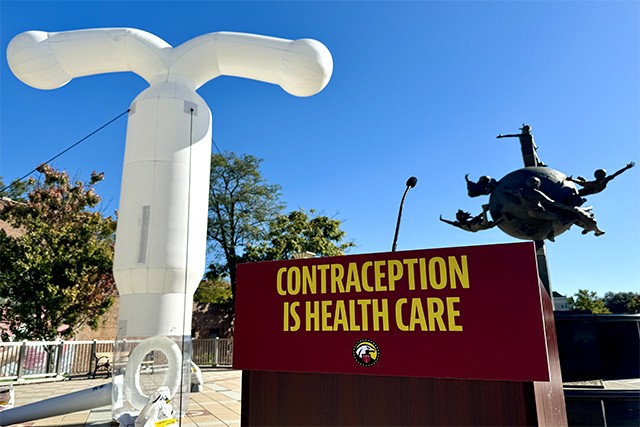Freeda, a 20-foot inflatable intrauterine device, visited the Decatur Square on Friday, Oct. 18, as state leaders advocated for maintaining access to contraception.
“On June 5, 2024, Americans for Contraception placed a 20-foot IUD at Union Station to call attention to the senate vote on the Right to Contraception Act happening later that day,” the Americans for Contraception website says. “Unfortunately, almost every Republican senator helped defeat this simple bill that would have protected our right to birth control like the pill, IUDs, and Plan B.”
Freeda (Womb) is meant to remind people that their bodies and choices are their own, the website says. Freeda has visited cities throughout the United States, including Pittsburgh, Phoenix, and Las Vegas.
The inflatable IUD was on the Square for a couple of hours on Friday morning but was taken down after a press conference with federal and state legislators. This weekend, Freeda will head to Wilmington, Raleigh, Durham and Greensboro, North Carolina.
“This is just one of the many pit stops around the country that Freeda will be making to bring awareness to what’s at stake during this election,” said Liz Ernst with Americans for Contraception. “I also never thought as a child that I would have to stand up for my bodily autonomy and reproductive healthcare.”
U.S. Rep. Nikema Williams (GA-5), State Sen. Elena Parent (D – Senate District 42), State Rep. Dr. Michelle Au (D – Johns Creek) and reproductive rights advocates, healthcare providers and concerned Georgians welcomed Freeda to recognize World Menopause Day and highlight the need for access to contraception.
“By focusing on the right to contraception, World Menopause Day underscores the need to safeguard healthcare choices that support women at every stage of life because that’s exactly what contraception does,” Ernst said.
Perimenopause and menopause are often treated with hormonal contraception, like an IUD. It can alleviate symptoms like hot flashes, mood swings and heavy bleeding, according to the Mayo Clinic.
“Contraceptives are a helpful tool to manage different medical conditions throughout life, including people going through the transition of menopause,” said Dr. Emily Troutner, an Atlanta-based obstetrician-gynecologist. “ I recently saw a patient who was experiencing low moods as well as intolerable hot flashes. I started her on estrogen therapy as well as an IUD to prevent problems with the lining of the uterus, and she was able to sleep better and get back to her life.”
Several states have introduced fetal personhood bills this year, which could lead to restrictions on contraception and ban common forms of birth control, Parent added.
“Time and again, Republican-led legislatures and our courts are mandating that reproductive medical care conform to certain religious views and not to long-established medical standards of care,” Parent said. “For those that are not yet alarmed, one only need to look to the recent Supreme Court decision overruling Roe v Wade. Taking these warning signs lightly is a huge mistake.”
During the legislative session this year, Parent filed a bill that would codify the right to contraception and contraceptives.
“A person shall have the right to obtain contraceptives and to engage or refuse to engage in the use of contraception,” the bill states. “A health care provider shall have the right to provide access to contraceptives and contraception-related information.”
It did not get a hearing in the state Senate.
“I want to be very clear that I want every Georgian to have guaranteed access to the standards of medical care that they have been able to rely on for decades,” Parent said. “Restrictions on the access is dangerous because it prevents people from making choices that affect their physical, mental, economic health and their wellbeing.”
Au said that as a doctor and a state representative, she took an oath to care for people. She added that the Legislature has continued to focus on access to medication abortion after passing a six-week abortion ban.
“So do you know what keeps me up at night? It’s the prospect that Georgia Republicans think the harm they’ve done already is not enough,” Au said. “Despite protestations to the contrary, [Republicans have] filed legislation that would erode access to contraception and IVF.”
She added that reproductive legislation can make doctors violate their Hippocratic Oath, what their experience has taught them and what medical science has shown.
“Because doctors want to be able to take care of patients without being vilified and criminalized, more and more doctors are choosing not to practice in Georgia anymore,” Au said. “That does not just mean fewer abortions, this means less healthcare.”
In Congress, Williams co-sponsored the Right to Contraception Act, which would maintain access to all forms of birth control and contraception. She tried to take it to the U.S. House floor but did not gain bipartisan support.
“We cannot allow politicians to make healthcare decisions for us,” Williams said. “Freeda, standing tall here today, is a reminder that this fight is real, and it’s happening right now.”
She added that the stakes are high for reproductive freedom this election season.
“This election will decide whether we move forward or whether we let extremists turn back the clock. It’s a call to action,” Williams said. “Stand with candidates who will never back down from defending our freedom to make our own personal healthcare decisions.”
This story was provided by WABE content partner Decaturish.










